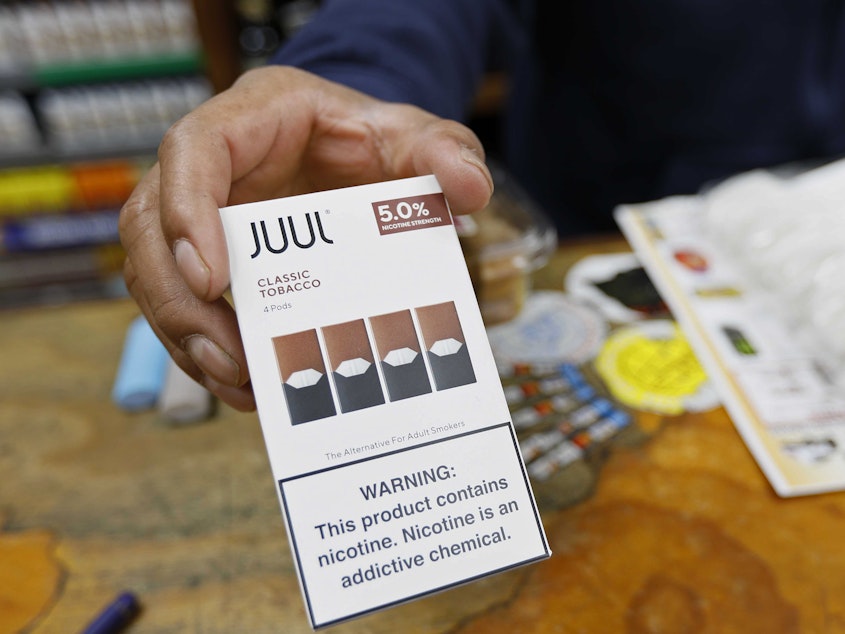Teen spirit smells like vaping, and other things lawmakers heard in Olympia

Washington state’s temporary ban on flavored vaping products expires in a few weeks.
The Washington State Legislature is reviewing a bill that would regulate the manufacturing and sale of vaping products, including extending temporary bans on products that are flavored or contain vitamin E acetate.
Vitamin E acetate is suspected to play a role in the lung illness that has spread across the nation among vape users.
The bill expands the role of the Liquor and Cannabis Board to regulate vaping products, including the ability to pull vaping products found to be harmful out of a store by suspending retailers’ and distributors’ licenses.
How to get around the vaping ban? Ask a Seattle-area teenager
In a public committee hearing Wednesday on SB 6254, lawmakers heard from a broad range of voices representing state and nonprofit health groups, the governor’s office, state health department, students and teachers, vaping store owners, former smokers and the American Vaping Association.
Hamilton middle schooler, Sophie Harrison told lawmakers it’s hard to escape the smell of vaping at school.
“At my school, the girl’s bathroom sign was scratched off," Harrison said. "Instead of saying 'girl's bathroom' it now says 'girl’s juul room.'”
Sponsored
Pediatrician Dr. Crystal Shen told lawmakers teens’ brains are vulnerable to nicotine addiction.
“One Juul pod is equivalent to one pack of cigarettes, in terms of 5% nicotine levels, and half a pod is enough to addict a teen.”
Vaping store owners and makers are against the proposal. Opponents say adults rely on flavored vaping products to get off cigarettes. Moses Lake store owner Margo Ross says her customers don’t want anything that reminds them of tobacco.
“Let’s not punish the adults for children and teenagers gaining access to products that are illegal for them in the first place.”
If banned, opponents argue, customers will go out of state to buy flavored products, or even make it themselves.
Sponsored
“Some are purchasing unflavored e-liquid from Washington state stores then going to the grocery store and purchasing food flavorings, some of which are oil-based and can damage their lungs,” Ross said.
As it currently stands the bill would:
- Ban all flavored vapor products, and anything that could be used to flavor a vapor product so it tastes or smells like anything other than tobacco.
- Ban products containing vitamin E acetate. The Centers for Disease Control and Prevention says there is a strong link between the substance and the outbreak of vaping-related lung injuries.
- Cap nicotine content in vape juice to 2 %, the same as in the European Union. (Juul pods contain 5%.)
- Cap the volume of vape juice sold to 10 milliliters in refill containers and two milliliters in disposable or single use products. Mandate the Liquor and Cannabis Board license vaping product manufacturers (costing businesses $250 per license). It would prevent manufacturers from also maintaining a retailer or delivery sales license, and prohibit mail and internet sales without a sales license. Licensees would have to submit to inspections by enforcement officers.
- Mandate that distributors and manufacturers disclose the ingredients in their vapor products to the state Department of Health, and put warning labels on their products. Prohibit free tastings and samples of vapor products and below-cost discounts.
- Direct the state Board of Health to adopt rules regarding the inspection of vaping product manufacturers.
The Washington Department of Health counts 23 cases of lung injury associated with vaping in the state as of January 15.
King, Snohomish, and Pierce counties have collectively had 13 cases. Across the state, nicotine products were involved in 15 cases, and THC was involved in nine.
Sponsored
There are no confirmed deaths in the state, according to DOH spokesperson Jamie Nixon.
Following an emergency order by Gov. Inslee in October last year, the state Board of Health imposed an emergency, temporary ban on flavored vaping products, which is set to expire February 7. A subsequent ban on products containing vitamin E acetate is set to expire March 19.
The governor proposed legislation January 14 to make the ban on flavored vaping products permanent.




